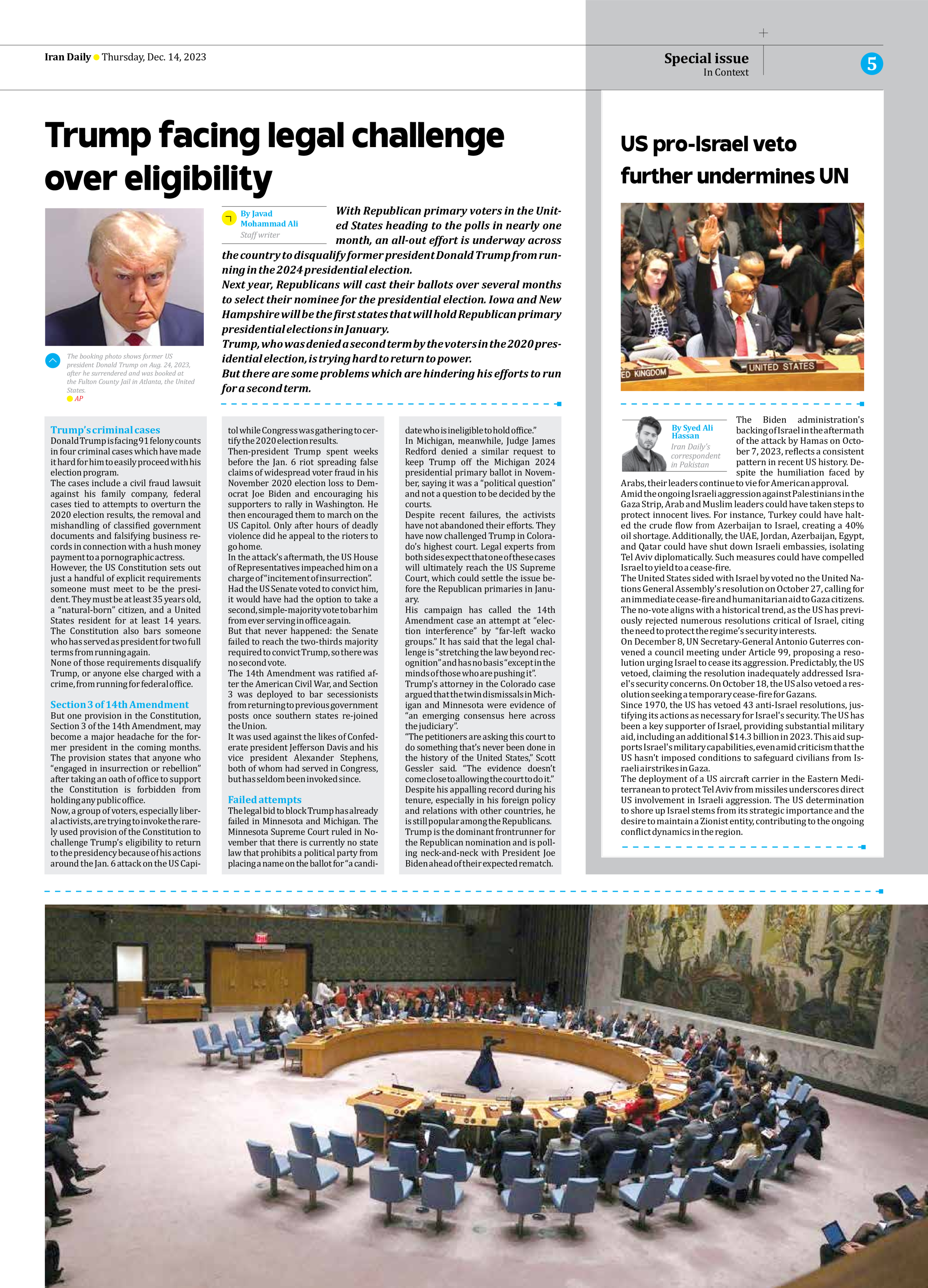
Trump facing legal challenge over eligibility
By Javad Mohammad Ali
Staff writer
With Republican primary voters in the United States heading to the polls in nearly one month, an all-out effort is underway across the country to disqualify former president Donald Trump from running in the 2024 presidential election.
Next year, Republicans will cast their ballots over several months to select their nominee for the presidential election. Iowa and New Hampshire will be the first states that will hold Republican primary presidential elections in January.
Trump, who was denied a second term by the voters in the 2020 presidential election, is trying hard to return to power.
But there are some problems which are hindering his efforts to run for a second term.
Trump’s criminal cases
Donald Trump is facing 91 felony counts in four criminal cases which have made it hard for him to easily proceed with his election program.
The cases include a civil fraud lawsuit against his family company, federal cases tied to attempts to overturn the 2020 election results, the removal and mishandling of classified government documents and falsifying business records in connection with a hush money payment to a pornographic actress.
However, the US Constitution sets out just a handful of explicit requirements someone must meet to be the president. They must be at least 35 years old, a “natural-born” citizen, and a United States resident for at least 14 years. The Constitution also bars someone who has served as president for two full terms from running again.
None of those requirements disqualify Trump, or anyone else charged with a crime, from running for federal office.
Section 3 of 14th Amendment
But one provision in the Constitution, Section 3 of the 14th Amendment, may become a major headache for the former president in the coming months. The provision states that anyone who “engaged in insurrection or rebellion” after taking an oath of office to support the Constitution is forbidden from holding any public office.
Now, a group of voters, especially liberal activists, are trying to invoke the rarely used provision of the Constitution to challenge Trump’s eligibility to return to the presidency because of his actions around the Jan. 6 attack on the US Capitol while Congress was gathering to certify the 2020 election results.
Then-president Trump spent weeks before the Jan. 6 riot spreading false claims of widespread voter fraud in his November 2020 election loss to Democrat Joe Biden and encouraging his supporters to rally in Washington. He then encouraged them to march on the US Capitol. Only after hours of deadly violence did he appeal to the rioters to go home.
In the attack’s aftermath, the US House of Representatives impeached him on a charge of “incitement of insurrection”.
Had the US Senate voted to convict him, it would have had the option to take a second, simple-majority vote to bar him from ever serving in office again.
But that never happened: the Senate failed to reach the two-thirds majority required to convict Trump, so there was no second vote.
The 14th Amendment was ratified after the American Civil War, and Section 3 was deployed to bar secessionists from returning to previous government posts once southern states re-joined the Union.
It was used against the likes of Confederate president Jefferson Davis and his vice president Alexander Stephens, both of whom had served in Congress, but has seldom been invoked since.
Failed attempts
The legal bid to block Trump has already failed in Minnesota and Michigan. The Minnesota Supreme Court ruled in November that there is currently no state law that prohibits a political party from placing a name on the ballot for “a candidate who is ineligible to hold office.”
In Michigan, meanwhile, Judge James Redford denied a similar request to keep Trump off the Michigan 2024 presidential primary ballot in November, saying it was a “political question” and not a question to be decided by the courts.
Despite recent failures, the activists have not abandoned their efforts. They have now challenged Trump in Colorado’s highest court. Legal experts from both sides expect that one of these cases will ultimately reach the US Supreme Court, which could settle the issue before the Republican primaries in January.
His campaign has called the 14th Amendment case an attempt at “election interference” by “far-left wacko groups.” It has said that the legal challenge is “stretching the law beyond recognition” and has no basis “except in the minds of those who are pushing it”.
Trump’s attorney in the Colorado case argued that the twin dismissals in Michigan and Minnesota were evidence of “an emerging consensus here across the judiciary”.
“The petitioners are asking this court to do something that’s never been done in the history of the United States,” Scott Gessler said. “The evidence doesn’t come close to allowing the court to do it.”
Despite his appalling record during his tenure, especially in his foreign policy and relations with other countries, he is still popular among the Republicans.
Trump is the dominant frontrunner for the Republican nomination and is polling neck-and-neck with President Joe Biden ahead of their expected rematch.







